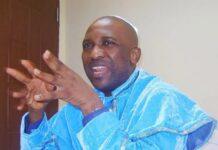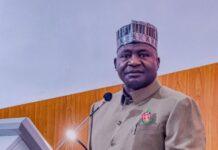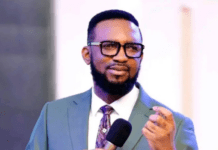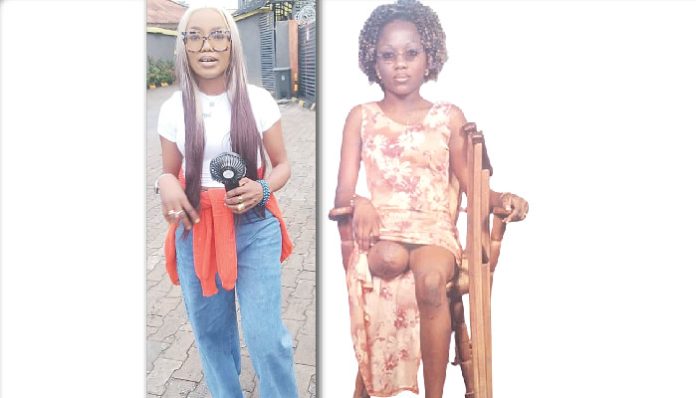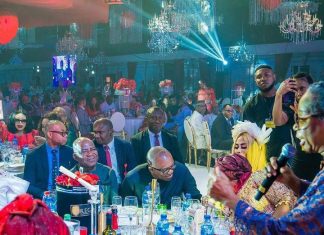

A businesswoman, Yetunde Ikotun Ojo, shares the life-changing accident she experienced while picking up birthday cake to celebrate her 23rd birthday, resulting in the amputation of her leg with TEMITOPE ADETUNJI
What circumstances led to your use of a prosthetic leg?
My name is Yetunde Ikotun Ojo. Ikotun is my maiden name, and Ojo is my married surname. I am 49 years old, married with two sons, and I work as a businesswoman. I hail from Ijebu-Ijesha, Osun State, but I currently reside in Ibadan, where I was born and raised. I come from a family of six: four girls and two boys. I completed my schooling in late 1997, studying estate management, and subsequently worked at the Afe Babalola law firm before transitioning to teaching at Lightforte International Schools, one of Ibadan’s earliest and most prestigious private schools.
I was employed as a preschool teacher at Lightforte when I experienced my accident in September 1998, just after my birthday on the 15th. While I can’t recall my last childhood birthday celebration, that year I felt that, with my job and modest income, I could host a few friends over the weekend to mark the occasion.
The accident occurred on September 17, 1998. I had been planning a party for September 19, 1998, which fell on a weekend. Thursday was the 17th, Friday the 18th, and Saturday the 19th. On that Thursday, after taking a walk, I visited one of my parents’ friends who made cakes because I had informed her I would come after school hours to discuss arrangements. We finalised our plans, and I was on my way home around 6:30 pm – 7:00 pm. Even as an adult, I knew I wasn’t supposed to go home late, and I anticipated my parents would have many questions.
I hurried back, and on my way, I met two colleagues on the bus. We chatted, and they got off two stops before mine. When I reached my stop, I got off and intended to cross to where I could catch a cab home. Unknown to me, a pickup truck, which had lost control, was coming from the main road. The driver swerved off the main route to enter my street. I was standing there, unaware of what was happening. The next thing I knew, a car was over me, and I found myself in the drainage.
What came to your mind the moment the accident happened?
I was very conscious. The only thing on my mind was, “Won tikan mi l’ese” (They’ve broken my leg). I thought I wouldn’t be able to celebrate my birthday on Saturday. I had a rush of thoughts, feeling a million things in a second. People were screaming and shouting. I told them my name and described my house so they could inform my parents. I asked them not to tell my father, who was just recovering from an illness. Somehow, they lifted the car off me, and an ambulance arrived. They took me to UCH Ibadan. I knew one of the things to do in trauma is to keep talking to stay conscious, so I kept talking, laughing, and telling them my life history, including my plans for my birthday.
When we arrived at the hospital, I was aware of the doctors attending to me. I could hear the alarms and everything but remained calm and mindful. It happened at the Orogun Junction, the junction to my parents’ house. My parents, a few neighbours, and well-wishers were there.
They said they would take me to the theatre to control the damage to my leg. I thought they would apply a plaster cast and elevate my legs for a few months. They also said I had a pelvic fracture, meaning I wouldn’t be able to sit up. I had other bruises on my thighs and legs.
When I woke up, I was already in the ward. I couldn’t sit up, but my right leg was itching. My mum was beside my bed, looking like she wanted to cry. Some doctors checked and started explaining. They said, “We are sorry.” They couldn’t save the ligament and muscle, so they had to amputate my leg. I didn’t realise what it meant at that moment. I asked for water, drank it, and slept again. That was the story of my amputation.
How old were you when the incident happened?
I was 23 years old.
How did you feel about the situation?
Well, one of the funniest things, and even up to today, is that anyone who knows me, my friends, and my family, knows that I never had an emotional breakdown from that incident. The next thing I remember was thinking, “Okay, this is a new life. How am I going to live this new life?” That was my next thought, and I started asking questions.
They said that after my pelvis healed, they would take me to physiotherapy, give me crutches, and teach me to walk with them, and so on. I was already planning on how to make the best use of my crutches.
What were the challenges you faced after the accident? Did anybody body-shame you?
Nobody could body-shame me because I was prepared. I don’t know where that emotional strength came from, but I was completely prepared for every bit of this. I don’t know how it happened. I can’t explain it, even now, years later. My emotional stability was so strong that they used my condition to encourage other people in the ward. For example, the doctors relocated another accident victim, Yinka Babajide, who was of the same age range and in a similar condition. She and her mum were involved in an accident on the same day and ended up beside each other in the ward. It was a traumatising experience for them, and they needed encouragement, so Yinka was moved to my side of the ward for a bit of motivation, and it worked well for her. She is also married with children somewhere in Abuja now.
How long did you spend in the hospital?
I spent three months in the hospital, from September to late November.
You mentioned earlier that you were working as a teacher, what school did you graduate from?
Osun State University, where I studied Estate Management.
How did you meet your husband?
I had a fiancé before my accident, who was in Abuja. When the accident happened, I knew I might drift away. I had already made up my mind that if he decided to end the relationship, I would be okay with it. I met my husband at my church. He had joined the church before my accident and was sent by the church to bring me to church services.
Did your ex initiate the end of the relationship?
It just didn’t work out. We stopped talking and I understood the situation and I moved on.
What attracted you to your husband and made you feel like he was the right person?
I won’t lie to you, at that time, I had no specific conditions or expectations. The only thing I knew was that God had taken over the wheel of my life, and I was following His lead. I wasn’t focused on falling in love; I was following where God led. The fact that my husband was kind, available, and didn’t back out was enough for me at that time.
What was the reaction from his family when he told them he wanted to marry you?
Certainly, there was a reaction from the family. How many families would you approach saying you want to marry an amputee and expect them to welcome such a conversation with open arms? I think he managed to persuade those who could be convinced and respected the decisions of those who couldn’t.
What year did you get married?
2001
Was it easy for you to raise your children with your condition?
Funningly enough, I always tell people that it’s when you haven’t faced a situation that you make projections about how you’ll handle it. But once you’re in it, if you depend on God, you will manage. Due to the pelvic fracture I suffered, there was a possibility it might be difficult for me to conceive. Even so, I became pregnant almost immediately after getting married.
The doctors warned me about potential difficulties with childbirth due to the pelvic injury, but I disregarded their diagnosis. Fortunately, I gave birth to my first son naturally and without prolonged labour.
My husband travels frequently, so most of the time it’s just me and the children at home. Particularly since my first son turned three, it has been just me and the boys. By the grace of God, we are all doing well.
How did your family and friends support you during your recovery and adjustment?
Well, I think I supported them more, but it was easy for them to support me because I wasn’t an emotional burden to anyone. It was straightforward for everyone to know their role. If I needed something, they would be there to assist me. I think they were more emotional about it than I was. They couldn’t understand how I was moving forward.
What was the most challenging part of transitioning to using a prosthetic leg?
It was mainly the need for grace and the fact that the first prosthetic I used was heavy. You wouldn’t notice once I wore it, but I could feel its weight. My first prosthesis, made in London, was metal. I remember my physiotherapist, Susan, always advising me to take it slow during my sessions.
How has your perspective on life changed since the accident?
It changed immediately after the accident. My perspective on life changed. You never know how you will react to a situation until it happens to you.
Can you describe your initial feelings when you first received your prosthetic leg?
It was a sense of excitement because I could now stand on two legs again, even if one was artificial. It was different from using crutches. Initially, I used two crutches, which caused pain in my shoulders. The crutch I use now at home is a lightweight aluminum one.
That was the first prosthesis they wanted me to use. I told them I was not using it. I would rather remain on my crutches than use that thing.
The one I got in London was metal. They were finer and more refined than the first one. So, you see, there was a journey before I got the one in London. We traveled all over, we went to Ife, Ogbomosho, to see some Indian people, I was my encouragement, let me just put it like that.
Nobody was trying to encourage me and that is why, as much as possible, I try to encourage people living with amputation, especially women.
You know, I try to support them financially and help them emotionally. There was a woman in my former shop. She used to come to see her friend. About two or three years ago, she had an accident inside a tricycle, and they had to amputate her leg.
While everybody was trying to encourage her, she was very emotional. Her friend just told her, the lady beside my shop,(referring to me) do you know that her leg has been amputated? How can they tell her? She used to look at me and admire me when she came to see her friend in her shop, so they couldn’t tell her that they amputated my leg. So, that one now begged me to go and see her. So, I went to see her, and even at that point in the hospital, she still did not believe that I was wearing a prosthesis until I removed it and showed her.
That was what gave her hope, and I helped in getting her rehabilitated. Even up to now, any time she has an issue, she contacts me.
How long have you been using yours?
This is my second one. I have had repairs done on my prosthesis over and over again.
There was a time I needed to change the socket, the foot, etc…the least repair was about N800,000 and that was just a socket.
What advice would you give to someone living with a disability?
I work with an amputee organisation, and when I walk into a room of amputees, there is always this feeling of “awe” when they learn that I am an amputee.
People living with a disability should develop self-confidence and believe in themselves. I believe everyone has a purpose in life, and how we end up fulfilling it is different. I have discovered mine, and I hope I can achieve much more.
What are you grateful to God for?
I’m grateful to God for life because, as I tell people, what God gave me was a new lease on life. The life I’m living now is completely different. I don’t know what might have happened if I hadn’t had the accident. I don’t know if I would have been better off, but the life I’m living now, I don’t regret. God knows that I’m naturally inclined to a soft life. I do not stress about anything; I do not struggle. What am I not grateful for?
I’m grateful for the gift of my children. When you have been told that you might not be able to have children, and then have two children easily, there’s nothing to be ungrateful for.
Today, with God with me, I’m so grateful for everything, for every waking moment. Despite being an amputee, I still go through the normal phases that other people go through, and it’s more difficult. Like this morning, I was feeling overwhelmed.
I’m grateful to God for so many things, the ability to cope mentally and financially. There are so many amputees out there who struggle, and that’s why I love encouraging people. I believe one of the reasons why God put me in this condition is so I can use my charisma and personality to affect others positively.
Join Television Nigerian Whatsapp Now
Join Television Nigerian Facebook Now
Join Television Nigerian Twitter Now
Join Television Nigerian YouTUbe Now

